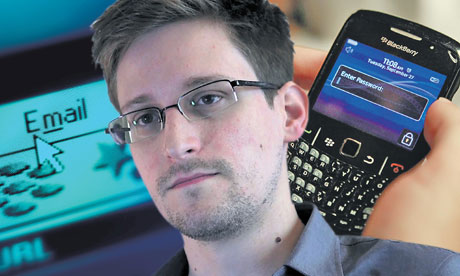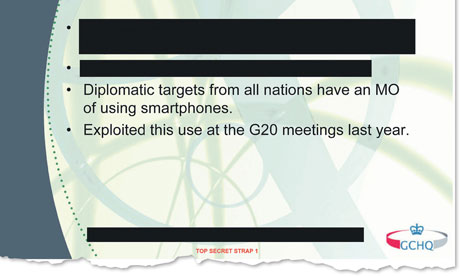
Documents uncovered by
the NSA whistleblower, Edward Snowden, reveal surveillance of G20
delegates' emails and BlackBerrys. Photograph: Guardian
Foreign politicians and officials who took part in two G20 summit meetings in London in 2009 had their computers monitored and their phone calls intercepted on the instructions of their British government hosts, according to documents seen by the Guardian. Some delegates were tricked into using internet cafes which had been set up by British intelligence agencies to read their email traffic.
The revelation comes as Britain prepares to host another summit on Monday – for the G8 nations, all of whom attended the 2009 meetings which were the object of the systematic spying. It is likely to lead to some tension among visiting delegates who will want the prime minister to explain whether they were targets in 2009 and whether the exercise is to be repeated this week.
The disclosure raises new questions about the boundaries of surveillance by GCHQ and its American sister organisation, the National Security Agency, whose access to phone records and internet data has been defended as necessary in the fight against terrorism and serious crime. The G20 spying appears to have been organised for the more mundane purpose of securing an advantage in meetings. Named targets include long-standing allies such as South Africa and Turkey.
There have often been rumours of this kind of espionage at international conferences, but it is highly unusual for hard evidence to confirm it and spell out the detail. The evidence is contained in documents – classified as top secret – which were uncovered by the NSA whistleblower Edward Snowden and seen by the Guardian. They reveal that during G20 meetings in April and September 2009 GCHQ used what one document calls "ground-breaking intelligence capabilities" to intercept the communications of visiting delegations.
This included:
• Setting up internet cafes where they used an email interception programme and key-logging software to spy on delegates' use of computers;
• Penetrating the security on delegates' BlackBerrys to monitor their email messages and phone calls;
• Supplying 45 analysts with a live round-the-clock summary of who was phoning who at the summit;
• Targeting the Turkish finance minister and possibly 15 others in his party;
• Receiving reports from an NSA attempt to eavesdrop on the Russian leader, Dmitry Medvedev, as his phone calls passed through satellite links to Moscow.
The documents suggest that the operation was sanctioned in principle at a senior level in the government of the then prime minister, Gordon Brown, and that intelligence, including briefings for visiting delegates, was passed to British ministers.
A briefing paper dated 20 January 2009 records advice given by GCHQ officials to their director, Sir Iain Lobban, who was planning to meet the then foreign secretary, David Miliband. The officials summarised Brown's aims for the meeting of G20 heads of state due to begin on 2 April, which was attempting to deal with the economic aftermath of the 2008 banking crisis. The briefing paper added: "The GCHQ intent is to ensure that intelligence relevant to HMG's desired outcomes for its presidency of the G20 reaches customers at the right time and in a form which allows them to make full use of it." Two documents explicitly refer to the intelligence product being passed to "ministers".

One of the GCHQ documents. Photograph: Guardian
According to the material seen by the Guardian, GCHQ generated this product by attacking both the computers and the telephones of delegates.
Read More Here
Related articles
- Snowden reveals British spies set up fake Internet cafes to monitor G20 (rawstory.com)
- Guardian Exclusive #2 Today: GCHQ intercepted foreign politicians' communications at G20 summits (Snowden leaks) (12160.info)
- | GCHQ intercepted foreign politicians' communications at G20 summits! (warcrimesinternational.wordpress.com)
- Ewen MacAskill, Nick Davies, Nick Hopkins, Julian Borger, and James Ball - GCHQ intercepted foreign politicians' communications at G20 summits (prn.fm)
- UK set up fake Internet cafes to spy on G20 officials (euobserver.com)
- Edward Snowden - How the UK Spied on its G20 Allies at London Summits (zen-haven.com)
- How The UK Spied On Its G20 Allies At London Summits (oneislandtwonationsblogspotcom.typepad.com)

No comments:
Post a Comment
Hello and thank you for visiting my blog. Please share your thoughts and leave a comment :)